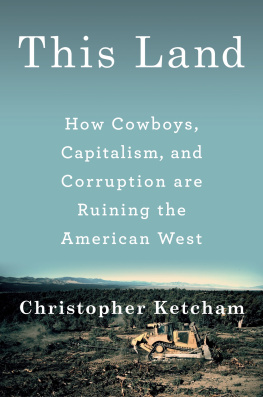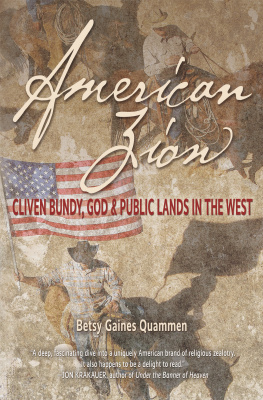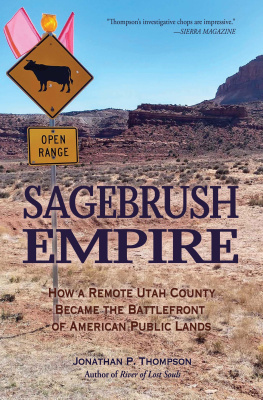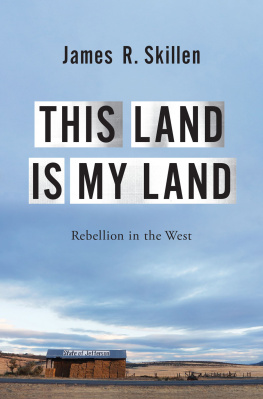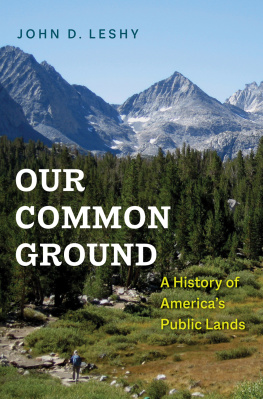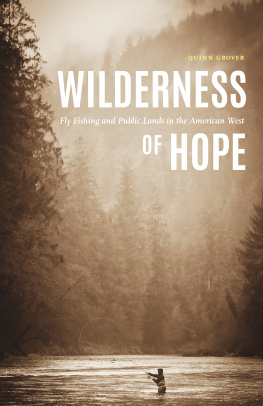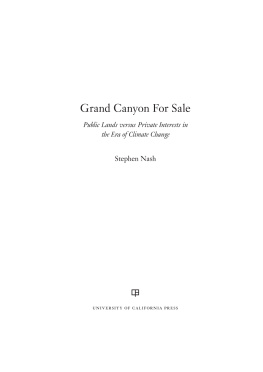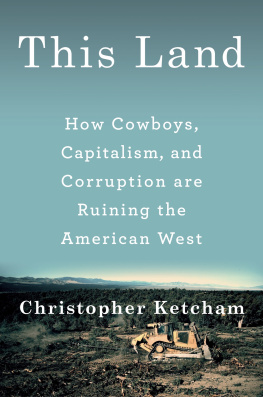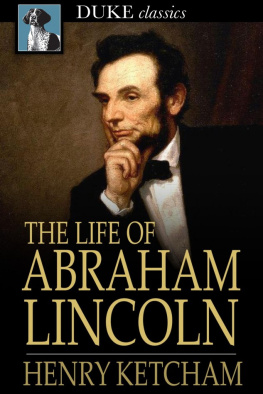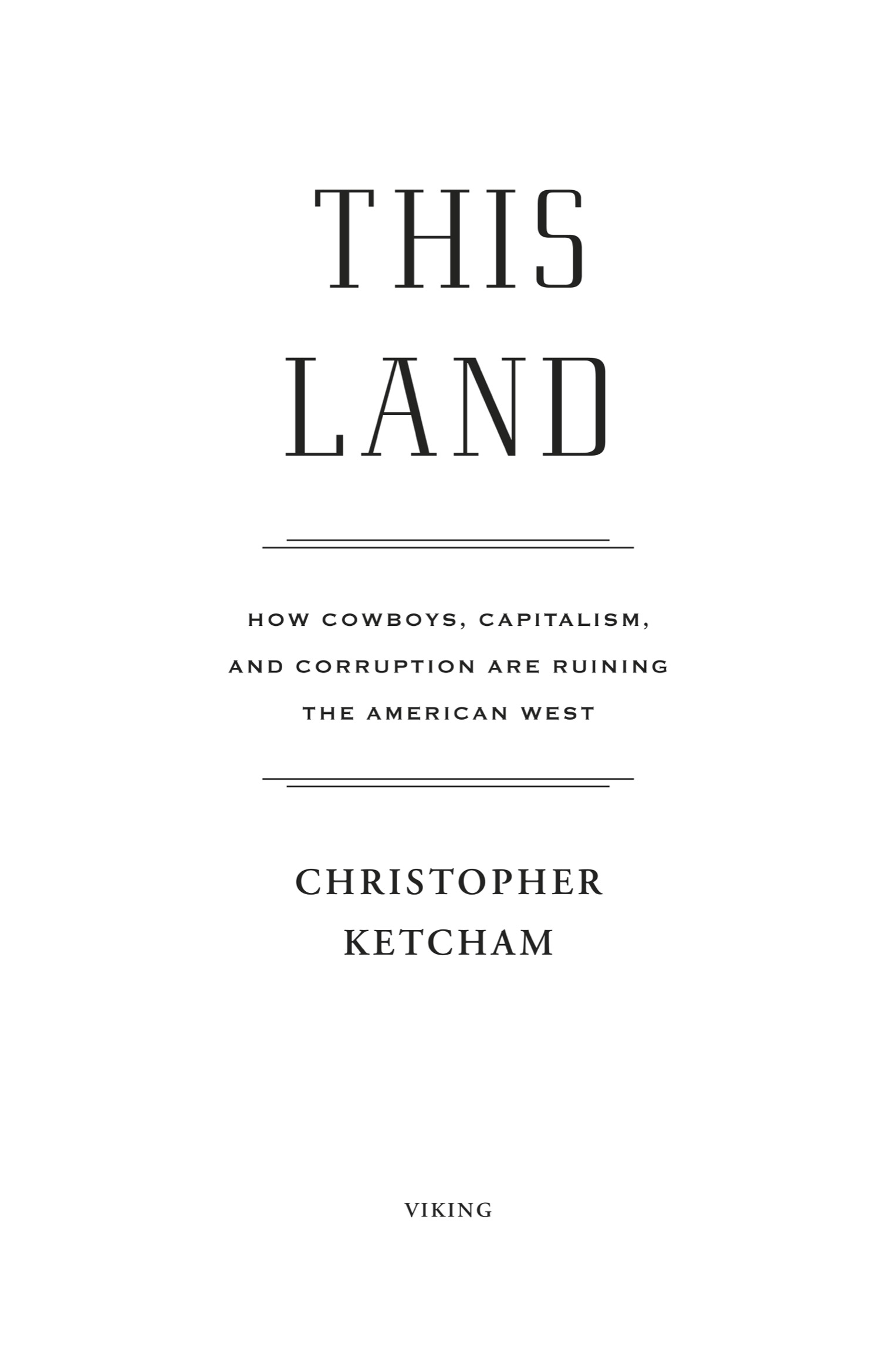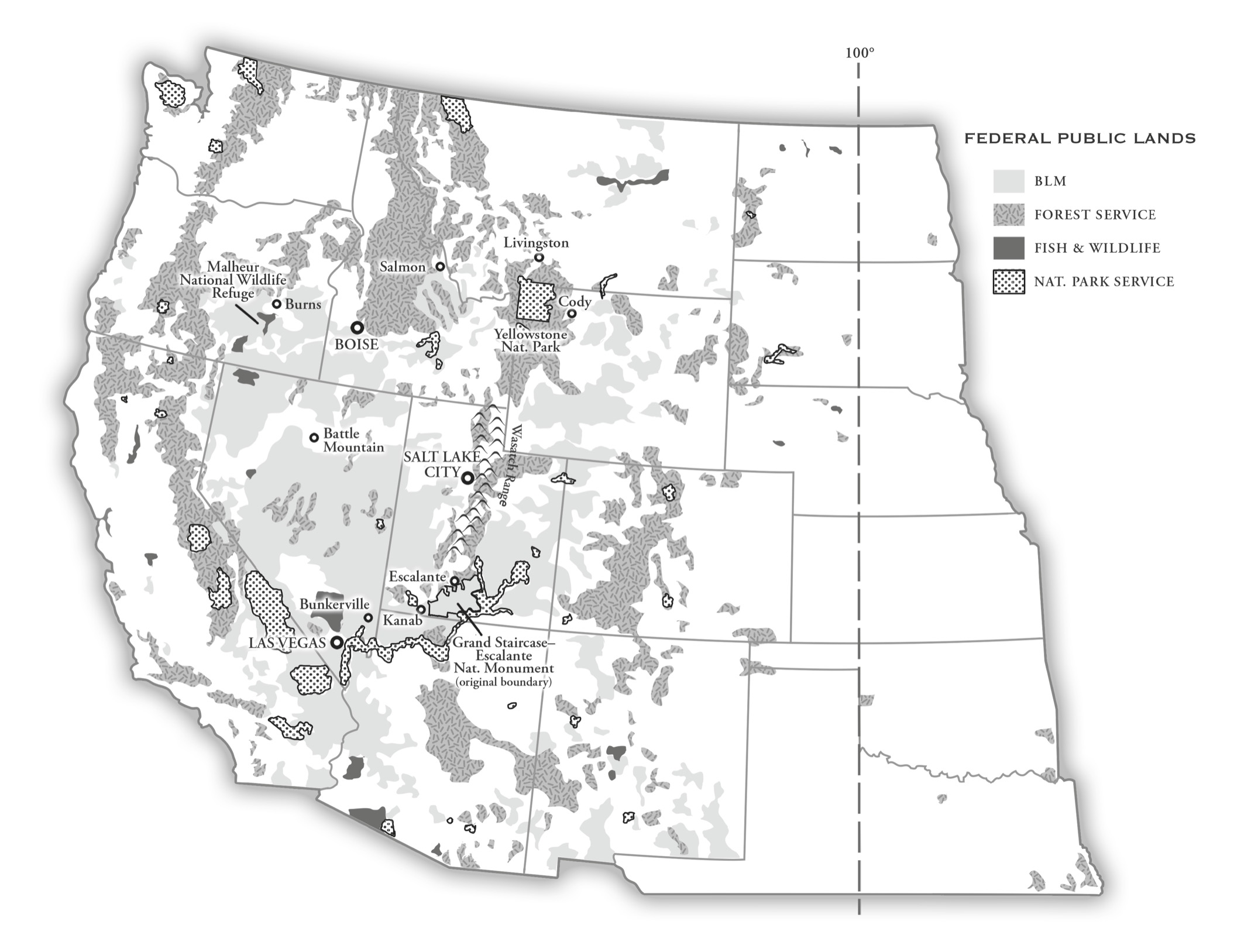Penguin supports copyright. Copyright fuels creativity, encourages diverse voices, promotes free speech, and creates a vibrant culture. Thank you for buying an authorized edition of this book and for complying with copyright laws by not reproducing, scanning, or distributing any part of it in any form without permission. You are supporting writers and allowing Penguin to continue to publish books for every reader.
Acknowledgments to the original publishers of portions of this book appear on .
Names: Ketcham, Christopher, 1973 author.
Title: This land : how cowboys, capitalism, and corruption are ruining the American West / Christopher Ketcham.
Description: New York : Viking, [2019] | Includes bibliographical references and index. | Identifiers: LCCN 2019002212 (print) | LCCN 2019018042 (ebook) | ISBN 9780735221000 (ebook) | ISBN 9780735220980 (hardcover)
Subjects: LCSH: West (U.S.)Environmental conditions. | Public landsWest (U.S.) | Environmental degradationWest (U.S.) | CapitalismEnvironmental aspectsUnited States. | Political corruptionEnvironmental aspectsUnited States. |
EnvironmentalistsWest (U.S.)Biography. | Ketcham, Christopher,
1973TravelWest (U.S.) | West (U.S.)Description and travel.
Classification: LCC GE155.W47 (ebook) | LCC GE155.W47 K47 2019 (print) | DDC 333.730978dc23
CHAPTER 1
In my book a pioneer is a man who turned all the grass upside down, strung bob-wire over the dust that was left, poisoned the water, cut down the trees, killed the Indian who owned the land, and called it progress. If I had my way, the land here would be like God made it, and none of you sons of bitches would be here at all.
CHARLIE RUSSELL , the Cowboy Artist
Ive been wandering the public lands trying to figure out whats left of the wild in the West. Utah, Nevada, Idaho, Oregon, Wyoming, the states with the most public land, the big wide-open, what Woody Guthrie was talking about when he sang of your land. Its a gigantic experiment in socialism out westwho could have imagined it in the most capitalistic country on earth?where everyone can say they own hundreds of millions of acres but no single person can claim it for themselves alone. This makes for high living. You can camp pretty much anywhere in some of the worlds loveliest places, at the bottoms of canyons and on the tops of mountains. Wherever you please, come along. Just dont wreck it for the next person.
Mostly I car-camp, living out of a tent, a tiny thing, enough room for me and one adult male wolf or two women or twenty-six weasels. Driving my rickety old Subaru, which gets me where I need between breakdowns, as slowly as possible, and trying not to think about the return east. Back there are the reasons I go west. The problem is the species common in the East, Homo urbanus iPhonicus, say in my native habitat in New York City. A creature clinched in its too-muchness and self-regard, staring at the unreality of screens, tripping over itself on the sidewalks, at turnstiles, in the museums, supermarkets, subways, wherever theres a surfeit of glass, steel, concrete, the human sardine can.
In the countryside of the East, the public lands are few. Whole mountains are privatized. Rivers and their banks, seashores, meadows, forests get hung with NO TRESPASSING and DO NOT ENTER signs and KEE P OUT and ELECTRONIC SUR VEILLANCE . Always there are fences, always the threat of prosecution for taking a walk in the woods. Forget about moving across the landscape freely, spontaneously, voluntarily. Forget about finding a view of this planet not reduced to the reminder of your fellow man. Love him you might, theres such a thing as enough of him.
Whereas in the West, in the lands that were never privatized, in the country of the pronghorn, the cougar, the grizzly, the bison, the sage grouse, the wild horse, and the wolf, where theres not enough water for the madding crowd but just enough for the wild things, a man is so free in his aloneness that he might not see another human being for weeks on end, maybe months if he has the genius for hiding high in the crags like the anchorites of old. I interviewed a guy once who went that route in a canyon near Death Valley, who came west from his overpriced midden of an apartment, leaving behind his useless shiny junk and job, and deserted in the company of the big books (Bible, Koran, Upanishads) to find the truthall for free, no rent due this month or any other. It is still possible in this country to find wild, clean, open spaces, where the rhythms of the natural world go on as they should, relatively undisturbed by industrial man. I fear the opportunity, though, could disappear in our lifetime.
You will be asking what exactly these public lands consist of. The national parks are a trivial portion, covering less than fifty million acres. Beautiful as they are, consider them a kind of specialty zoo, heavily funded postage-stamp island ecosystems, overseen for wildlife but mostly for tourists. For our purposes the West is the roughly 450 million acres of grassland, steppe, desert, and forest managed in trust for the American people by the United States Bureau of Land Management (BLM) and United States Forest Service. These agencies are unsung sisters of the National Park Service, little known and meagerly funded. Here on the BLM and Forest Service lands are glaciers towering in the sky, deep Permian canyons, ten-thousand-foot plateaus, sagebrush seas, places where herds of big mammals roam unhindered. Here you can hike, fish, hunt for meat, raft, ride horseback, fire a Kalashnikov, sling an arrow, climb a tree, build a hut out of sticks, roam like the aboriginal tribes of the continent, get lost, stay lost for as long as you wish.
Its an American commons, and the chief requirement to enjoy it is some degree of self-reliance. Reliable water supplies, ready-made campsitesyoull find few of these things such as the national parks afford. The roads are often unsigned. They are muddy by turns of the season, or dusty to the point of choking, or rutted so as to threaten with death the struts of your car, or overgrown with vegetation to the point you dont know theyre there. Abandon your steel behemoth, strike out from the roads, and you might dip a toe in the landscape. Walk on for a month or so, you might live like an animal, naked in the dirt, howling at the moon. Ive done this on occasion.
That the BLM and Forest Service domain accommodates profit hunters is the crucial difference separating it from the national parks. You can prospect on these lands, extract commodities. Congress has enshrined in law this practice of multiple use. Look across the public lands and youll find the myriad uses: oil and gas fields in the deserts and steppe, and coal, copper, silver, and gold mines stabbed into cliffs and mountains. Forests are felled, grasslands overgrazed, wildlife slaughtered, and roads carved for all parties to gain access and exploit public ground for private gain. The BLM and Forest Service are schizoid. With one hand they protect; with the other they ravage. Such is multiple use. William O. Douglas, a backpacker and outdoorsman who happened also to be the longest-serving Supreme Court justice, shared his suspicions about the real meaning of the term in 1961: Multiple use was semantics for making cattlemen, sheepmen, lumbermen, miners the main beneficiaries. After they gutted and razed the forests, then the rest of us could use themto find campsites among stumps, to look for fish in waters heavy with silt from erosion, to search for game on ridges pounded to dust by sheep.

